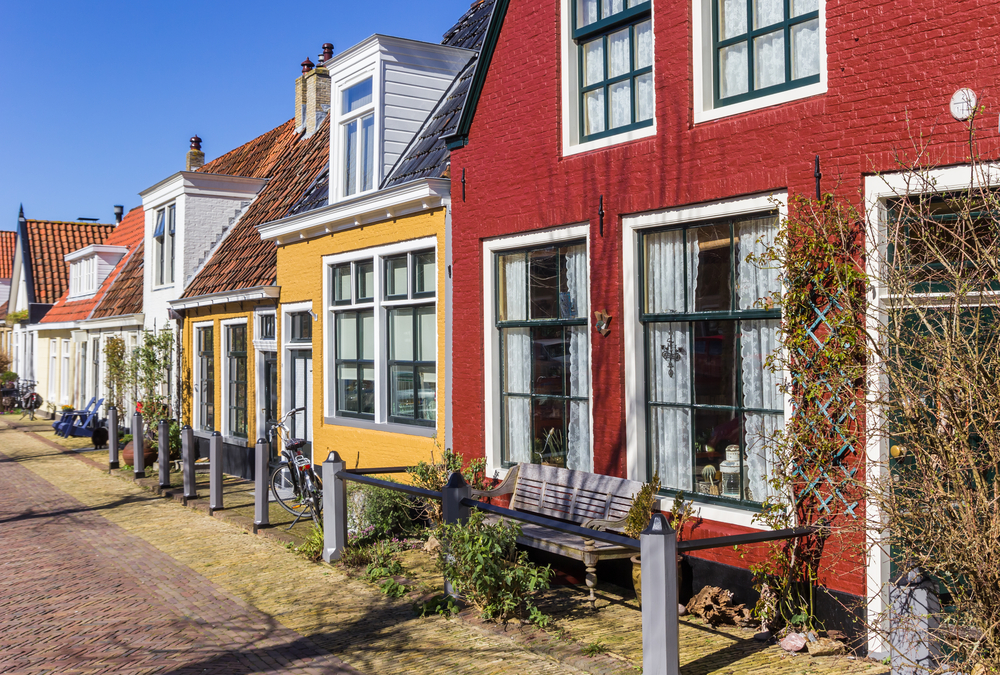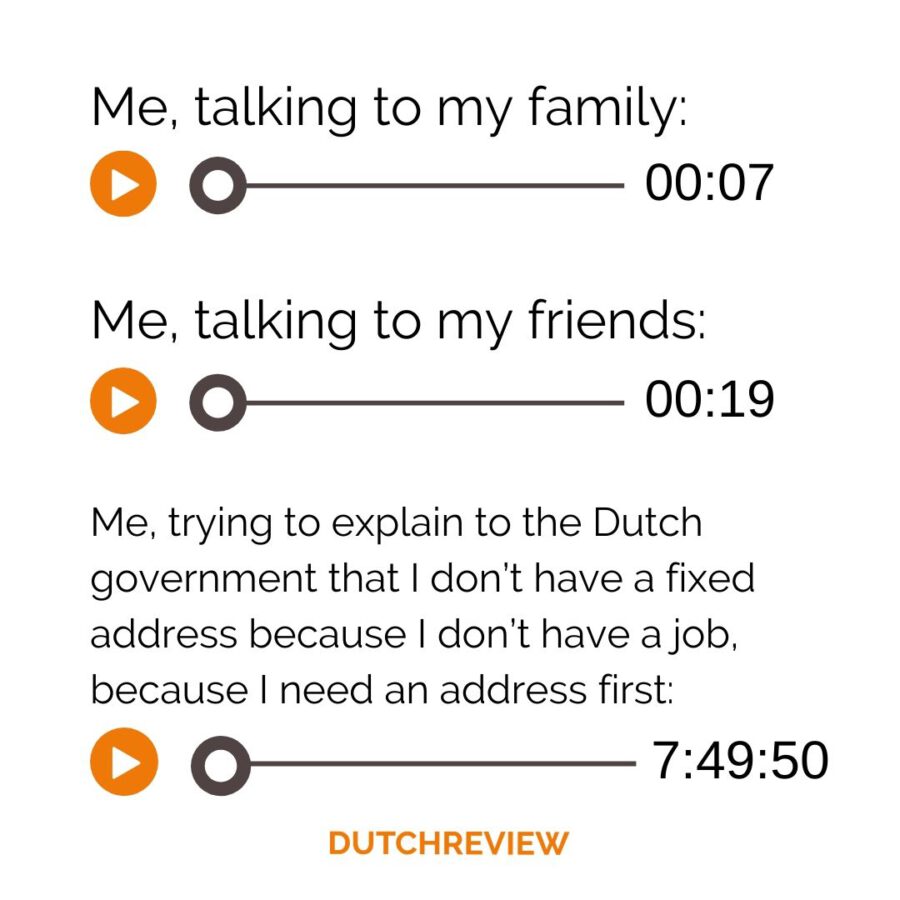There are some things the Dutch don’t talk about that they really, really should. What on earth is in ‘bitterballen’? And why is the Netherlands a tax haven?
From the absence of curtains to the unspoken presence of colonialism, the Dutch really should address some of these things. That being said, we don’t address Sinterklaas and his problematic helper – that’s a whole other conversation on its own.
1. Curtains: Why don’t they close them?
Listen. In most countries, people close their curtains when night falls, because the darkness outside means that everything you do inside your house can be seen from outside. We knew the Dutch are into openness, but open curtains? Really?

For better or worse, Dutch people tend to keep their curtains open in the evening, especially in their living and dining rooms.
You can see families chatting, eating together, or watching TV as you stroll through the city, which is lovely. But also… unique. Why don’t we talk about this more?
2. Bureaucracy: Never a topic at the Dutch dinner table
There’s no doubt that a little bit of bureaucracy is great. Even a lot of bureaucracy is great. But the Netherlands goes way too far on this front, and many internationals especially struggle with it.
It seems like a bad joke at first when you realise, OK, I need a fixed to get a BSN, which I need for my job, which I need to afford… the fixed address.

Alas, it is true, and it is a struggle. Dutch people, though, don’t ever talk about this! Presumably, those of us from somewhat disorganised countries just aren’t used to this level of organisation.
READ MORE | Dutch Quirk #6: Live by their agendas when making plans
Or maybe it’s because the Dutchies have been indoctrinated since birth to tell the government everything about themselves…
3. Feminism: The Netherlands is not top-ranking
The Netherlands prides itself on its gender equality and generally on its progressive values. However, discussions on feminist issues in the Netherlands regarding gender equality do not happen very often.
READ MORE | 11 kick-ass Dutch women you should know of
With only 11% of men taking paternity leave, there is still a significant pay gap between the genders here. ⚖
Although the Netherlands retained its spot in the World Economic Forum’s Global Gender Gap Report for 2024, it still only ranks number 28 in the world when it comes to gender equality.
READ MORE | Being a feminist in the Netherlands: surprisingly, it’s a challenge
There is a real danger in being too complacent and self-satisfied with past progress for these issues. The Netherlands still has room for improvement, and talking about feminism is just the beginning.
4. We’re sinking! Does anyone want to address this? No?
Look, we understand why you’d want to ignore this one. No one wants to think about being accidentally underwater, but science has shown that the Netherlands is slowly sinking. Will we survive? Maybe.
The Netherlands is sinking 🤩🤩 pic.twitter.com/7q1KHBPROx
— Election Memes for Pingu Teens (@EEMemez) February 6, 2021
With sea levels set to rise as a result of climate change, it’s weird that most Dutchies don’t talk about the distinct possibility of, well, being underwater soon.
READ MORE | Dutch Quirk #124: Not care about the fact that they’re living below sea level
We’re confident that the Netherlands, famed for its innovation and sustainability, will come up with a great solution when they eventually start talking about this.
5. Dutch colonialism: The historical elephant in the room
As is the case with most former colonial powers, the Dutch don’t talk about colonisation nearly enough. Generally, the VOC and the Dutch Golden Age are viewed as a part of history the Netherlands should be proud of.

Of course, on closer inspection, these eras were as full of exploitation and racism as art, trade, and nationalism.
But this makes the Dutch go rather quiet, even in museums like the Rijksmuseum, which won’t stop using the term “Golden Age”. 🔎
6. The Netherlands is a tax haven: Shhhh!
Another awkward one: the Netherlands is an internationally renowned tax haven, which is not something that we ought to shout about proudly. But talk about it? Sure, if it’s ever going to change.
The Netherlands has created an effective strategy for encouraging foreign investment: offering multinational companies an enticing package of subsidies and tax breaks if they choose to locate here.
READ MORE | Do the royals pay taxes in the Netherlands?
For one, this creates a “race to the bottom” among countries worldwide, meaning a very low tax rate for corporations.
But it also vastly reduces the amount of tax revenue the Netherlands receives, and ultimately forces higher taxes on working and middle-class people.
7. ‘Bitterballen’: What’s really in them?
While internationals living in the Netherlands love to complain about Dutch food, Dutch people themselves barely mention it.
Is this out of grief? Perhaps. But it may also be because there is a dark secret behind the ingredients of the nation’s favourite snack — bitterballen.

Usually eaten alongside a few drinks (so you forget to wonder what you’re eating), Dutch people point-blank refuse to tell you what is in these salty, fried, vaguely meaty snacks. 👀
OK, we admit it. This might be one thing we’re kind of glad that Dutch people don’t talk about. No one REALLY wants to find out and have to say goodbye to these (potentially snail-filled) snacks.
What other things do the Dutch not talk about that you think they should? Tell us your thoughts in the comments below.





Great eye opening article. Thank you. No society or country is perfect but change is needed. Social justice, income equality and fairness are basic tenets of a true democracy. Support political parties and candidates in future elections who stand and fights for those ideals.
Sounds like Communism what you support. Evidently you never traveled to Eastern Europe prior to “The Wall” coming down.
Well that’s a canard. I traveled in Eastern Europe before the wall came down and had the questionable pleasure of being arrested for minor infractions by the East German VAPO a couple times. Fines were payable on the spot unless you wanted to be taken to that “station”. There was no due process. That’s authoritarian. You, Glenn, need to know social justice, Socialism, and even Communism are not totalitarianism as you seem to think. It serves some interests to conflate totalitarian, authoritarian, dictatorship with Socialism. They are not the same just because they often go together in despotic authoritarian governments. The Netherlands is about as Socialistic as any country on earth yet freedom is not limited compared to most other countries. Anyone disagree?
#1 is true, why bother having a nice home if it doesn’t envy your neighbor. 😉
#2: True, the struggle is real, not just for those coming here.
#3: Sadly true. What can I say, I try to get the correct people elected but others don’t do the same 🙁
#4: “this minor problem and come up with a solution” nuff said
#5: Yes and no There is certainly room for a lot of improvement, I am thinking about things like the Black Pete discussion, public exposure (Art, de Gouden Koets, monuments etc). On the other hand in schools it is told, well at least it was in my days (30ish years ago) and it was clear for me we have been a bunch of assholes. I tend to think, that would not have been the case if they would have “whitewashed”
#6: True but I think we are starting to do better
#7: There is absolutely no secret what is inside bitterballen. The exact same thing that is inside kroketten 🙂
The Dutch don’t complain about the role of “Zwarte Piet”, Black Peter, who has been criticized, abused and scolded by so many foreign rooted people. This personality is usually a white person with a blackened face, who accompanies Saint Nicolas, who comes to reward or scold the children on their behaviors and studies. The actual person of Saint Nicolas is a person who freed slaves from slavery and if they wanted, could stay with him. Now many opportunists want to abolish this feast, that is made only to give joy to basically the children and their parents. We should complain, but don’t!
History generally. I honestly wonder do they study history in school? Also politics generally. When I try to get colleagues at work to explain things I don’t understand on the news about arguments in parliament I mostly get blank looks.
Terrible article filled with Social Justice Warrior propaganda. You are not interested in our country, you are solely interested in spreading your political views.
The article is outright insulting.
What good does it do to “speak about the history of colonialism”? We all know this was a thing in the past and nobody is doing it any more. We also don’t talk about witch burnings, which were awful. But its quite boring to keep talking about things which there is a consensus about.
Don’t get me started on feminism. It should be measured by equal opportunity, not equal outcome. People and men and women are allowed to make different career and personal choices. This doesn’t make us sexist, it’s just an outcome of individual freedom. You don’t understand the first thing about scientific interpretation of data, clearly.
I’d be happy to discuss and/or debate any of this with you and post it online. I won’t let you slander our small beautiful multiculti country like this!
Fully agree with Bart, people imposing their limited social justice perspectives and bringing their own baggages in a country that has achieved loads.
LOL happy it makes people upset that the Netherlands is a tax haven.
Peace!
Many Dutch people don’t even know the history of Indonesia . They call the Nederlands Indische Indonesians .
As a born and raised Dutch woman( till 1993 when I left for the US, with the exception of 2012-2017 when I was back home). I can only agree with this article. I don’t feel offended by a vision of someone not born or raised in the Netherlands, it is a process of understanding the culture, which takes decades( I know, I still don’t understand all in the US). And if I would have written it, I would have stated most of the auteur’s points. My big question is: why do we feel attacked by comments/ critique on our country from “foreigners” while everyone in the Netherlands critique or have comments like this on f.I the US. I can not count the negative remarks I received when I emigrated there in 1993 from Dutch people, nor the remarks of them about being back home from the US, back to “ normal” Holland. Sorry, no country is normal, has no skeletons in their past and is going to get comments and critique from people looking from outside in. I feel that this author tried to understand and with her own cultural background looked at things she does not understand. It is a good thing to teach others about who we are, without sugarcoating and hiding facts and be defensive